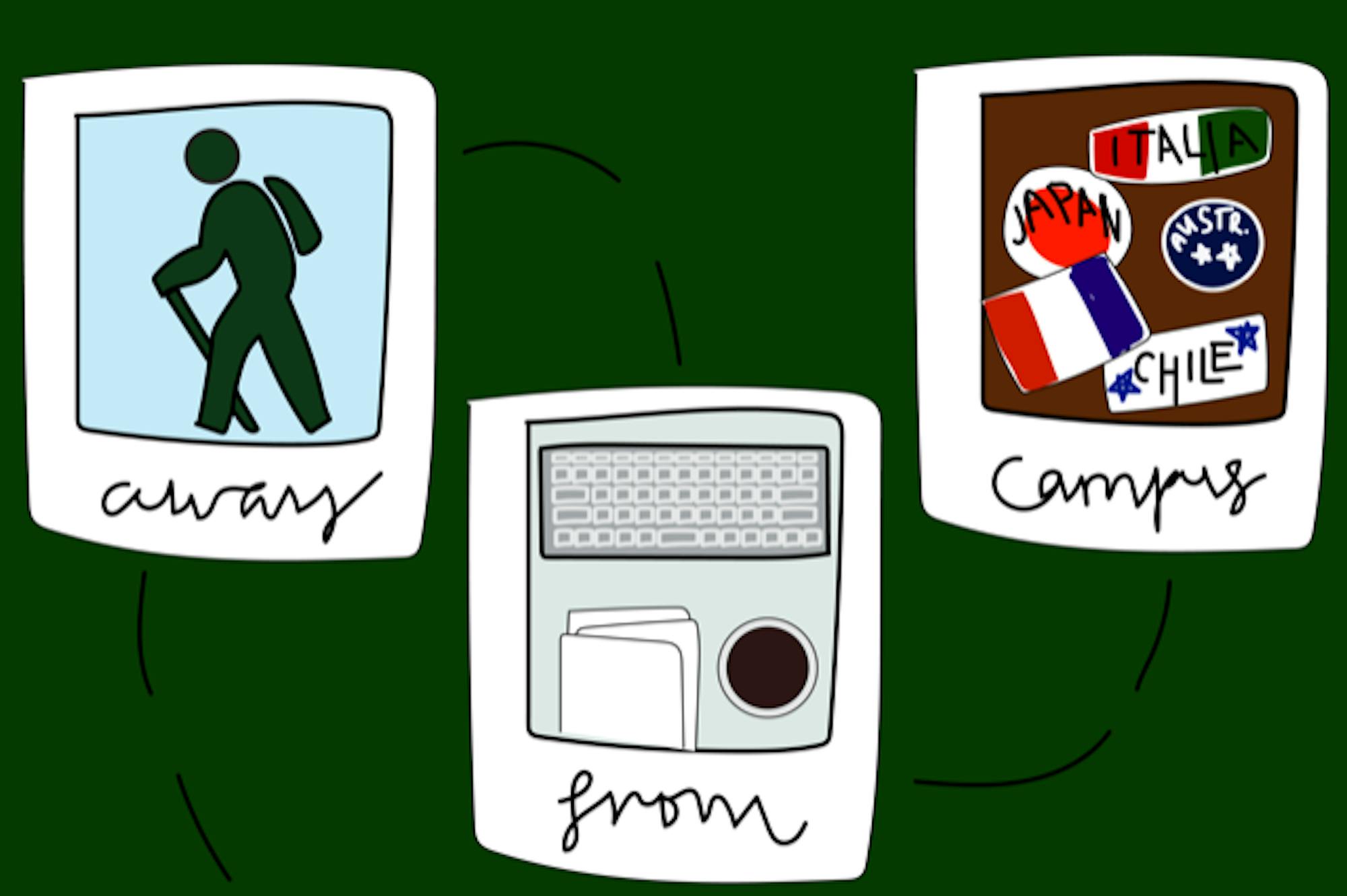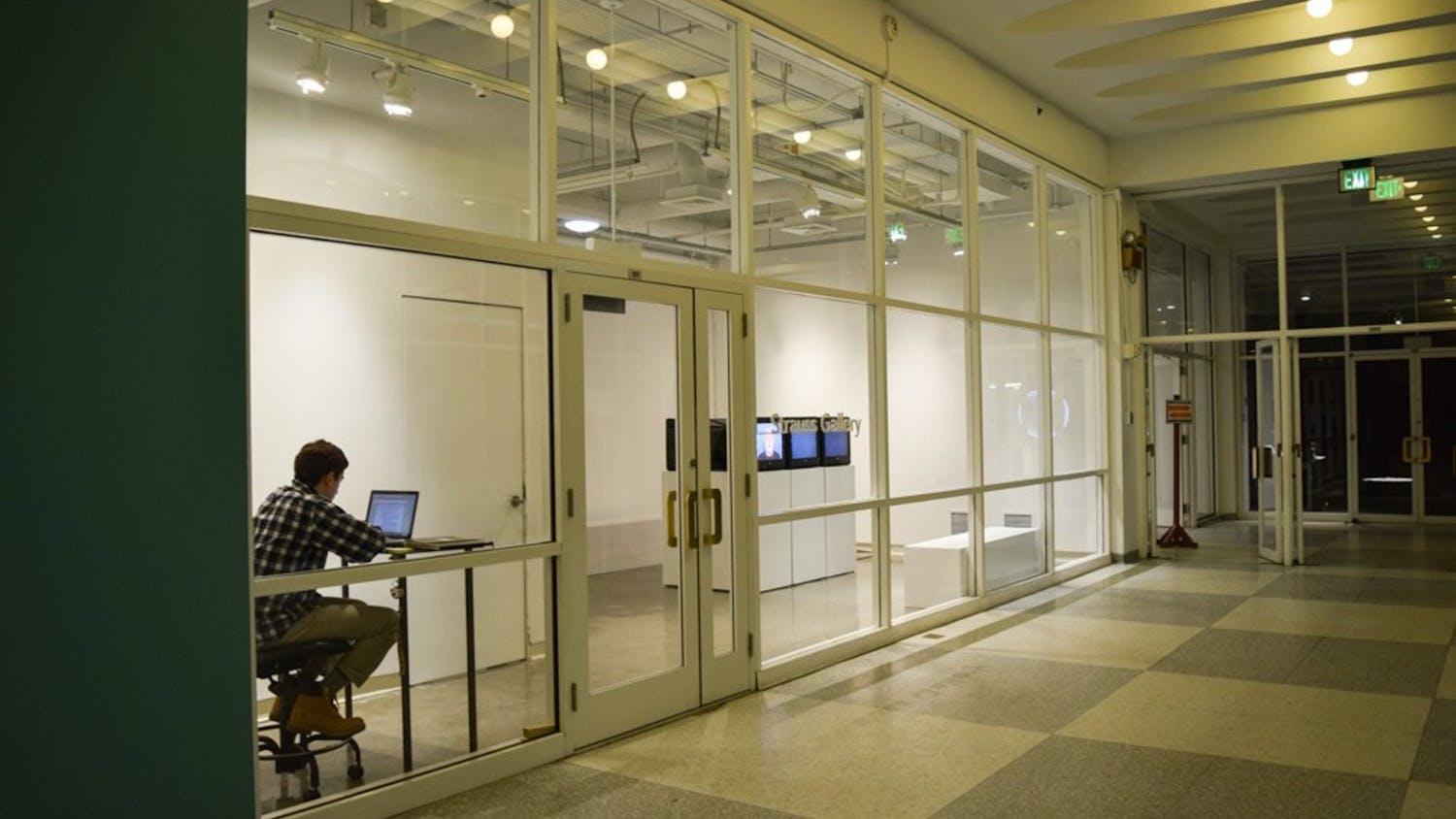This article is featured in the 2020 Fall special issue.
This year, many Dartmouth students have revised their ideas of what a college experience should look like. As the pandemic continues to upend plans, some students have opted to remain away from campus until the situation improves. From spending time in the great outdoors to caring for toddlers, students are finding other avenues to learn during this academic year.
One student, Zanna Gulick-Stutz ’23, has successfully avoided online class since the beginning of the pandemic. She took the spring off and spent it backcountry skiing while living with a friend in Teton County, Idaho. Over the summer and into early fall, she worked as a raft guide in Bend, Oregon. Now, after road-tripping throughout the western U.S. she has holed up in Lander, Wyoming, where she is taking a Wilderness EMT class.
“I decided to do this as a way to continue working towards a goal and being in an educational environment,” Stutz said. “I can be in an in-person, hands-on place here — when that’s not available at Dartmouth right now.”
After the course, Stutz said she will be heading to Salt Lake City, Utah to work as a ski patroller at Solitude Mountain Resort. She is excited to apply her newfound skills at “a bigger mountain that’s not in New Hampshire.”
While Stutz has been using her time off school to pursue her outdoor passions, Alexander Fell ’23 seized the opportunity to extend his summer internship at a venture capital firm in Los Angeles. He was originally planning to return to Dartmouth in the fall, but due to the College’s COVID-19 restrictions, he decided to take the year off and keep working.
Fell described his day-to-day work as a mix between investor relations and analyst research. While he started out the internship working remotely from home, he has since moved to Los Angeles to work in person. Because the firm is small, he said he gets to wear a lot of hats and has a say in investing decisions, which has been exciting for him.
“I love what I’m doing,” Fell said. “Meeting cool founders, interacting with the hottest movers in the tech space. … [It’s] super cool to be a part of that environment.”
Fell has not yet declared his major, but he believes that in finance, one’s course of study doesn’t matter as much as work experience. He said he feels “really lucky” to enjoy his full-time job, and that he doesn’t need a Dartmouth workload to consume his time.
“I felt like I was learning on the job, so why not take the whole year off and do it, and get the full Dartmouth experience the year after,” Fell said.
John Dwortz ’23 also decided to temporarily forgo school for a full-time job offer: For over a month now, he said he has been nannying a two-and-a-half-year-old boy with learning disabilities. Instead of writing papers, he has been spending his time watching ocean documentaries, making grilled cheese and discovering hidden talents.
“[I’ve learned that] I can actually pick poop up with my bare hands,” Dwortz said. “I’ve learned that I have a horrible singing voice but a great voice for lullabies. I’ve learned that I should read audiobooks for a living, because this kid is out the second I start reading Winnie the Pooh.”
Dwortz also explained that he felt academically directionless his freshman year. He hasn’t yet chosen one subject to dedicate himself to, and he spent the remote spring and summer terms taking classes for fun. While he acknowledges that other people are able to put their heads down and power through online class, he knows that he is not that kind of person.
“People are f—ing racing to get through [school],” Dwortz said. “For me, it would be racing towards, I don’t know when. And I ran in high school — typically, you wouldn’t start a race without knowing how long it is, because that would be really annoying.”
Dwortz added that going into his second year at Dartmouth, he felt like he was there to get a degree instead of an education. Taking time off to care for a toddler has helped him regain a sense of purpose.
“[Picking a degree] feels so false, just really phony,” Dwortz said. “I don’t feel that way when I’m cooking this kid lunch.”
While some students are feeling the pressure to pick a major, others have yet to begin the college experience in earnest. Renata Hoh, who deferred enrollment and now plans to begin college with the Class of 2025, cited mental health as her primary reason for delaying her matriculation at Dartmouth. An international student from Salvador, Brazil, she was worried that online class would be exhausting and that she wouldn’t get the support she needed. She also believes she would miss out on valuable peer interactions outside of the classroom.
“I really like to be around people and to meet new people — that's something that I really value in education,” Hoh said. “That would be more difficult if I were attending online classes.”
Since March, Hoh has been staying in Sao Paulo with 13 other girls in a republic — a student housing option similar to American sorority houses. She enjoys being around people her age and getting to watch movies or go on weekend excursions with them.
Hoh said she has been keeping herself busy. She does public relations work for SuperMentor, an online site that helps Brazilian students who are applying to school in the U.S. She also works for Garotas Podem!, educating 12 girls about female empowerment and gender equality, and Aplica! Prep, the company that gave her a scholarship last year, by tutoring five girls who are also scholarship recipients.
Hoh is also using her time to learn programming and calculus to prepare for college coursework, as well as engaging in relaxing activities like painting and drawing. She knows that while it’s important for her to have projects to occupy herself during her gap year, she likes doing the work on her own time, as opposed to rushing through the educational system.
“We go from elementary school to high school and then to college and then to work,” Hoh said. “Especially because there are girls here who are already finishing college and working ... I feel that it’s very good to have this break from all those responsibilities.”
As an upperclassman, Breanna Glover ’22 knows the feeling of rushing through her education and not being in control of her time at Dartmouth. She describes her attitude toward school, extracurriculars and her sport as “Type A.”
“I’ve just done everything that I thought I was supposed to do in the order in which it was supposed to be done,” Glover said. “It took a lot of reframing my perspective to be at a point where I was like, taking time off from school is okay.”
Being a three-season athlete and therefore exempt from the sophomore summer requirement, Glover took the summer off. When fall came around, she decided not to enroll in classes. She is currently living in an off-campus house and spends her time pursuing a fellowship through the Dartmouth Center for Social Impact, two research positions with the College and a part-time online tutoring job.
While Glover now intends to take a gap year, she still sometimes questions her decision.
“If I’m taking five years to graduate, does that make me less of a person? Am I being too easy on myself?” she asked.
These are the questions that impacted Glover’s decision to take a gap year. However, Glover and many other students have found that there’s value in just taking some room to breathe.
In Glover’s own words, “giving yourself time and space can be really powerful.”
Given that COVID-19 is still raging across the U.S. and many parts of the world, and that the Dartmouth winter term is expected to be similar to the fall, more students may be considering taking a break from school.
From her cabin in Wyoming and over spotty Wi-Fi, Stutz said that she has been recommending the gap year to those who have reached out to her. She thinks it’s great that more people are considering taking one amid the uncertainty that is school during COVID-19.
“You don’t have to be doing something really extravagant in order to find that time off valuable,” Stutz advised. “[You get to] look at a chunk of time and be like, ‘Hey, what’s important to me? What do I value? What do I want to dedicate myself to learning?”




